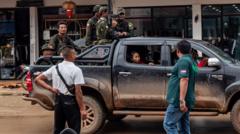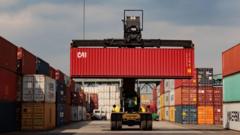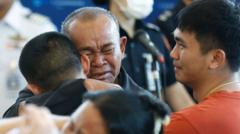Shwe Kokko, a Chinese-led city in Myanmar's Karen State, has emerged as a hub of luxury amidst accusations of scams and human trafficking. The ambitious project, however, faces challenges from ongoing civil unrest and a deteriorating reputation that threatens its viability.
Shwe Kokko: A Mirage of Ambition Amidst Scams and Violence

Shwe Kokko: A Mirage of Ambition Amidst Scams and Violence
An exploration of Shwe Kokko, a controversial city in Myanmar riddled with illegal activities, as efforts are made to shift its tarnished image.
The serene landscape of cornfields along the Moei river in Myanmar contrasts sharply with the towering, modern buildings of Shwe Kokko—a striking urban development that rose from a region long marred by a devastating civil war. Once an impoverished area, Shwe Kokko, or Golden Raintree, has gained notoriety as a potential hotspot for fraud, money laundering, and human trafficking, with its creator, She Zhijiang, currently in a Bangkok jail pending extradition.
Despite the claims by Yatai, She Zhijiang’s company, promoting Shwe Kokko as a luxurious resort destination intended for affluent Chinese tourists, the reality presents a starkly different picture. As Beijing exerts increased pressure to clamp down on the scams targeting its citizens, Thai authorities are enhancing oversight measures that threaten to disrupt the inflow of tourists vital for Shwe Kokko’s survival.
Getting to Shwe Kokko is no easy task, particularly amidst the ongoing civil conflict in Myanmar. Journalists hoping to visit must navigate multiple checkpoints and deal with the precarious security situation. For the BBC, a representative guided the tour, showcasing the investments made, including paved roads and upscale villas while under tight security supervision from local militia.
Initial impressions of Shwe Kokko resemble those of a burgeoning provincial city, populated predominantly by ethnic Karen as they toil for daily wages. Yatai downplayed the question of what types of businesses operate within the high-rises, alluding to upscale visitors while feigning ignorance about ongoing scams.
Interviews with former workers disclosed a grim reality. Scams proliferate, with networks targeting vulnerable individuals worldwide, including retirees, through manipulative online relationships. The former employees' accounts reveal disturbing practices involved in these scams, raising alarms about the continued existence of exploitative operations.
Though Yatai asserts its commitment to eradicating fraud, local whispers suggest otherwise. Many buildings remain shrouded in secrecy, with restricted access, enhancing the perception of a deep-seated criminal enterprise. The youths of Shwe Kokko, including former scam workers, spoke candidly about the prevailing scam culture overshadowing any legitimate business aspiration.
Understanding She Zhijiang—characterized by his rise from poverty in China to the architect of Shwe Kokko—requires recognizing the complex intersection of criminality and ambition. Facing accusations of human trafficking and illegal operations, She’s fall from grace has been swift. He continues to claim innocence, posting that Yatai aims to cultivate a reputable entity separate from the malpractice overshadowing its efforts.
Yet, with the region engulfed in violence from competing factions, and limited investment due to shunned reputations, Shwe Kokko’s future hangs in the balance. The unrelenting instability makes the prospect of legitimate business near impossible, leaving the economy vulnerable to the revival of scams and exploitation.
In an attempt to counteract negative publicity, Yatai has leveraged media exposure to present Shwe Kokko as a flourishing urban utopia. However, as international scrutiny mounts, concerns regarding human rights violations and the exploitation of workers signal an increasingly complex and dark narrative interwoven with ambition, desperation, and survival in a lawless environment.
As authorities continue their crackdown on illegal operations, the fate of Shwe Kokko ultimately remains uncertain. With tourist numbers dwindling and headlines exposing grim realities, the ambition initially meant to elevate the city now serves as a cautionary tale of how dreams can quickly succumb to the shadows of exploitation and lawlessness.

















